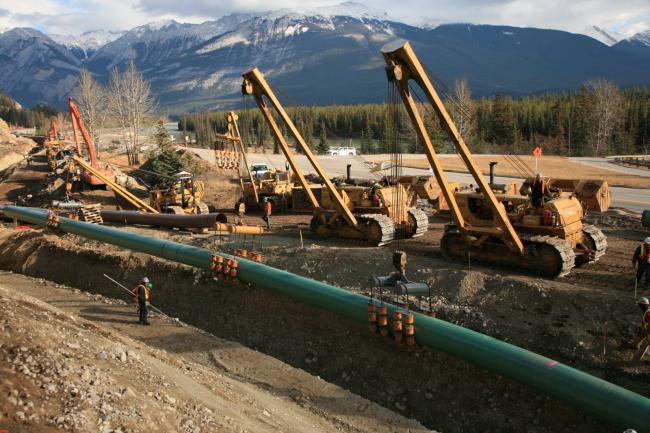Articles Menu

The Coldwater Indian Band alleges that someone tampered with evidence submitted by Kinder Morgan to Canada’s pipeline regulator to avoid a costly route change on the company's Trans Mountain expansion project.
The Texas-based energy company has proposed to install the new oil pipeline near an aquifer that provides drinking water for the First Nation in the central interior region of British Columbia.
“The water that’s there feeds over 90 per cent of our community and that’s our only source of drinking water," said Coldwater Chief Lee Spahan. "Our backup system is our fire truck..."
While the company submitted a geophysical report to support its proposed route, the First Nation said the company used "false or misleading" evidence in route hearings that should be "disregarded" by the federal pipeline regulator, the National Energy Board (NEB). The regulator must make a decision on the final route before the project can proceed after its hearings conclude.
Lawyers for Coldwater made the dramatic allegation about the "tampering" on June 12 in a legal submission sent to the NEB. They said in the submission that they had discovered more than two dozen alterations to a report about the aquifer that was stamped by professional geologists and used by the Texas energy giant’s Canadian unit, Trans Mountain, in ongoing route hearings.
The lawyers said they noticed the differences after Kinder Morgan gave them a "draft" version of a document — called the "Frontier Report" — in June 2017, and compared it with the one that was recently submitted to the NEB on April 20, 2018 as part of the route hearings.
“It is evident that the Frontier Report has been tampered with in some respect,” said a June 14 letter to the NEB from lawyer F. Matthew Kirchner. “It seems unlikely that it was altered by the authors of the report as that would appear to contravene the professional guidelines (for professional geologists and engineers)… Regardless, it is clear that the document that is now in evidence is different than the document that was signed and sealed on May 23, 2017.”
Kirchner's letter also noted that the signatures, seals and dates on both versions of the report were identical, despite the alterations. Government guidelines require new seals to be added if a document is changed to certify that it hasn't been modified or tampered with in any way.
"Making changes to a report, without resealing, signing and dating the report, would be contrary to this basic professional obligation," said the letter.
The company didn't respond to requests for comment about the letter.


The allegation submitted to the NEB throws another curve ball into the unfolding Trans Mountain saga, less than a month since Prime Minister Justin Trudeau’s government announced plans on May 29 to purchase the project and related assets for $4.5 billion.
The allegation also follows admissions from Trans Mountain and the federal Fisheries and Oceans Department that the company had repeatedly violated an environmental law during recent construction work near an oil terminal in Burnaby, in metro Vancouver, as part of the expansion project.
The Trudeau government approved the project on Nov. 29, 2016, but it has been mired in delays and cost overruns that the company has blamed primarily on provincial and municipal governments seeking to slow down the permitting process. The government decided to buy the project after Kinder Morgan threatened to cancel the project due to uncertainty caused by opposition in B.C..
The project requires more than 1,000 federal, provincial and municipal permits in order to proceed, as well as the NEB's approval on the final route.

The Coldwater Indian Band is also part of a court case that is challenging the federal government's approval of the project. The band's existing proposal for a route change could drive up costs for the project that is already estimated as at least $7.4 billion and rising.
In an interview with National Observer, Coldwater Chief Lee Spahan said the new evidence puts the company's integrity on the line. He said the company appears to be trying to take the cheapest route through his nation's territory, instead of the safest one.
"They’re trying to get anything done to make sure it goes through their proposed route which we don’t want," he said.
The nation has fewer than than 1,000 members, including 344 who lived on one of its two reserves in 2013, the band says on its website. The aquifer is critical to their health and well-being, Spahan explained.
“The water that’s there feeds over 90 per cent of our community and that’s our only source of drinking water," he said. "Our backup system is our fire truck and that’s not really a backup system because our fire truck is small, and that wouldn’t even satisfy the community... Our groundwater from wells is our only source of water and that’s a huge concern for us."
The NEB responded to their allegation on June 14. The regulator requested a detailed submission from Coldwater before June 20, asking the band to outline the specific alterations spotted in the report.
Trans Mountain would then have five days to respond, before allowing a final reply from Coldwater on June 27.
"Prime Minister Justin Trudeau is saying that he wants to implement UNDRIP (United Nations Declaration on the Rights of Indigenous Peoples) — he wants to stop the boiling water advisories (by March 2021) for First Nations, yet he doesn't look at the impact on our aquifer when the proposed pipeline goes right through our aquifer," Spahan said.
In a statement, a spokesman for federal Natural Resources Minister Jim Carr said that the pipeline expansion project was subject to the "most exhaustive review in the history of pipelines in Canada."
"A key pillar of that review was our engagement and consultation with local communities," said the spokesman, Mackenzie Radan, in the statement sent to National Observer. "Our government is committed to the ongoing work of reconciliation with Indigneous peoples and it's why we've undertaken important work like the co-developed Indigenous Advisory and Monitoring Committee. Communities, alongside the National Energy Board will monitor the project throughout its life cycle to ensure it moves forward in the safest and most sustainable way possible."
Chief Spahan also also invited the prime minister to visit Coldwater, noting that Trudeau had recently paid a visit to B.C. to meet with chiefs on the advisory committee who support the Trans Mountain expansion project.
"He takes the time out of his schedule to attend a meeting with the chiefs that support the pipeline and yet he won't take the time to come to Coldwater and listen to myself, my council and my membership about our concerns and our issues," Spahan said.
"If there's a message in this, then I'd like to be loud and clear that there's an open invitation for the prime minister to come to Coldwater and speak with us."
[Top Photo: In an undated image, crews work on Kinder Morgan's Trans Mountain pipeline in Western Canada. Photo courtesy of Kinder Morgan Canada]